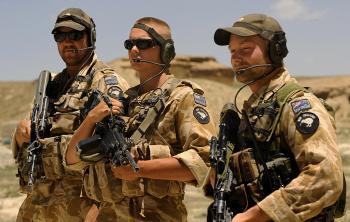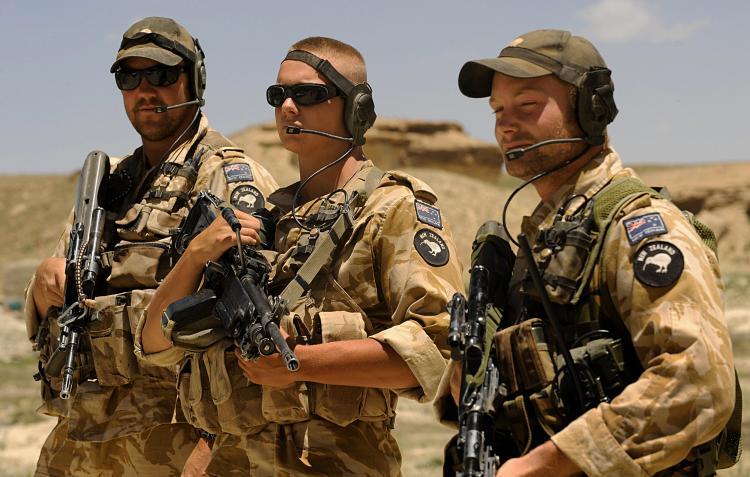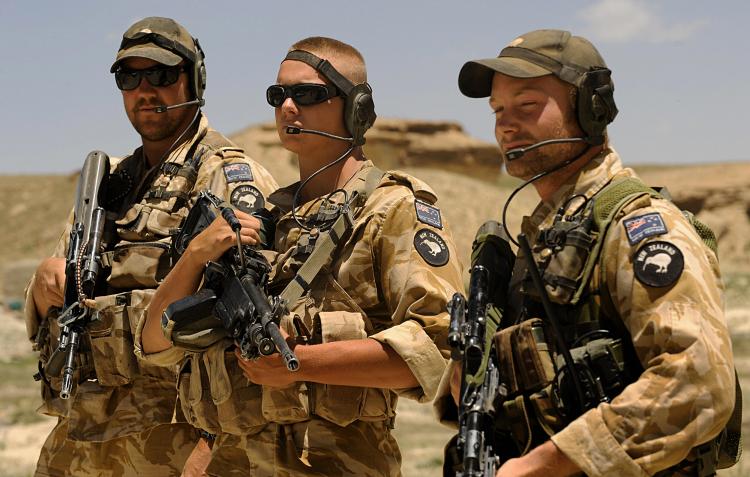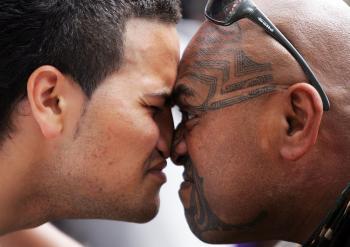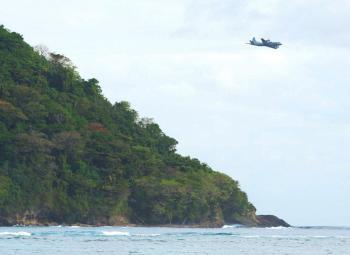NEW ZEALAND—Public opinion polls show that half of all New Zealanders are opposed to the Special Air Services (SAS) being deployed in Afghanistan. The war is actually serving to strengthen the Taliban, Keith Locke told parliament earlier this month.
Oxford Professor Hew Strachan, a military expert and world-renowned historian, has been giving a series of lectures on wars during a visit to New Zealand, and gave his views on the conflict in Afghanistan to The Epoch Times.
The United States and the United Kingdom justify their action in Afghanistan as being a means of preventing terrorist attacks in their own countries, he says, but people, particularly in the U.S., simply do not believe this.
“The public believe that radical Islam is being encouraged at home by the deployment of troops in Afghanistan. Then British Muslim youth are inspired to go to train as terrorists and then come back again. So it works the other way around.
“But then the logic becomes self-fulfilling because every time a terrorist attack outside of Afghanistan takes place, it becomes a justification for the continuation of the war, thus creating a cycle that is hard to break.”
The war potentially creates what it is trying to prevent, he said.
There are two forces—the Taliban, with whom most engagements take place, are not a terrorist threat to the Western world. They are only concerned with Afghanistan. The threat is Al-Qaeda and Bin Laden. Al-Qaeda is taking advantage of the situation in Afghanistan, but if it becomes “too hot” they will move on. They are now in Pakistan and were previously in West Africa.
In recent weeks the New Zealand Government has said that the main reason for going to Afghanistan is to prevent it from becoming a “safe haven” for terrorism.
However, it is possible that if this goal is achieved it will only result in pushing terrorism abroad.
The strategy used by the coalition partners is problematical, says Professor Strachan.
Counter terrorism and the 911 attacks were the fundamental reasons the coalition went into Afghanistan and became involved in the conflict between the Taliban and the Northern Alliance.
“That’s demanding that the coalition doesn’t just do counter terrorism but does counter insurgency as well, which is an incredibly expensive and demanding activity because it means the establishment of good government, programmes for reconstruction, delivering justice, all of which are incredibly ambitious agendas which require resources above and beyond what the coalition has been willing to put in to it.”
I believe United States President Barack Obama wants to concentrate on counter terrorism, rather than counter insurgency, to avoid a repeat of the 911 bombing.
However, General McChrystal, U.S. military commander in Afghanistan and Mr Obama’s allies have “bought” into the justification of counter insurgency and that they are in Afghanistan to provide stability and ensure the elections are conducted properly, none of which will make any difference to the fight against Al-Qaeda.
But Al-Qaeda will not be affected as it is an entirely different organization, says Professor Strachan.
Unless Al-Qaeda is caught in Afghanistan, a successful war effort will only push it into another country.
New Zealand needs to ask if it is prepared to send the SAS anywhere in the world to confront Al-Qaeda.
There is also the issue of national sovereignty. The fact that Afghanistan was in a state of disarray made it a suitable haven for terrorism. However, turning it into a viable country would make it unsuitable for terrorist activities and would force terrorists to go elsewhere.
It appears that the United States has been influential in the decision to deploy the SAS in Afghanistan. Mr. Locke likened the intervention in Afghanistan to New Zealand’s unjustified involvement in the Vietnam War.
However, Professor Strachan said buying goodwill from the US is a perfectly legitimate foreign policy. Special Forces should be used in counter terrorism and counter insurgency, not just trained year in and year out.
The SAS are more likely to be engaged in the fight against terrorism within Afghanistan, he believed.
At the same time as the SAS was deployed, the New Zealand Provincial Reconstruction Team (NZPRT), a peacekeeping and reconstruction force, was withdrawn.
Mr. Locke said that in his opinion, the peacekeeping effort in Afghanistan had been successful and should continue.
Professor Strachan was also “mystified” as he believed that the two forces would have worked concurrently.
“The PRTs ensure stability whereas the SAS are more deployable. The PRTs have been criticized recently but there is still a role for them there. The argument for pulling them out because of insufficient troops is hard to sustain when these are different groups with different functions.”
Prime Minister John Key told Newstalkzb recently that he believed the New Zealand deployment would help to ensure a safer world and it was vital that the country play a part in stamping out the threat of terrorism in Afghanistan. The September 11 attacks in America and the London and Bali bombings were instigated by people trained in Afghanistan, he said.
You can’t eliminate terrorism completely, said Mr. Strachan. The most sensible response is to prevent it from spreading and becoming a universal threat.
“Terrorism is a weapon of the weak. The number of people killed in most terrorist attacks is comparatively small, maybe shocking but small. What gives it impact is over-reaction by governments, open reaction by governments and hyping by the press, whereas the sensible response is a covert one.”
Oxford Professor Hew Strachan, a military expert and world-renowned historian, has been giving a series of lectures on wars during a visit to New Zealand, and gave his views on the conflict in Afghanistan to The Epoch Times.
The United States and the United Kingdom justify their action in Afghanistan as being a means of preventing terrorist attacks in their own countries, he says, but people, particularly in the U.S., simply do not believe this.
“The public believe that radical Islam is being encouraged at home by the deployment of troops in Afghanistan. Then British Muslim youth are inspired to go to train as terrorists and then come back again. So it works the other way around.
“But then the logic becomes self-fulfilling because every time a terrorist attack outside of Afghanistan takes place, it becomes a justification for the continuation of the war, thus creating a cycle that is hard to break.”
The war potentially creates what it is trying to prevent, he said.
There are two forces—the Taliban, with whom most engagements take place, are not a terrorist threat to the Western world. They are only concerned with Afghanistan. The threat is Al-Qaeda and Bin Laden. Al-Qaeda is taking advantage of the situation in Afghanistan, but if it becomes “too hot” they will move on. They are now in Pakistan and were previously in West Africa.
In recent weeks the New Zealand Government has said that the main reason for going to Afghanistan is to prevent it from becoming a “safe haven” for terrorism.
However, it is possible that if this goal is achieved it will only result in pushing terrorism abroad.
The strategy used by the coalition partners is problematical, says Professor Strachan.
Counter terrorism and the 911 attacks were the fundamental reasons the coalition went into Afghanistan and became involved in the conflict between the Taliban and the Northern Alliance.
“That’s demanding that the coalition doesn’t just do counter terrorism but does counter insurgency as well, which is an incredibly expensive and demanding activity because it means the establishment of good government, programmes for reconstruction, delivering justice, all of which are incredibly ambitious agendas which require resources above and beyond what the coalition has been willing to put in to it.”
I believe United States President Barack Obama wants to concentrate on counter terrorism, rather than counter insurgency, to avoid a repeat of the 911 bombing.
However, General McChrystal, U.S. military commander in Afghanistan and Mr Obama’s allies have “bought” into the justification of counter insurgency and that they are in Afghanistan to provide stability and ensure the elections are conducted properly, none of which will make any difference to the fight against Al-Qaeda.
But Al-Qaeda will not be affected as it is an entirely different organization, says Professor Strachan.
Unless Al-Qaeda is caught in Afghanistan, a successful war effort will only push it into another country.
New Zealand needs to ask if it is prepared to send the SAS anywhere in the world to confront Al-Qaeda.
There is also the issue of national sovereignty. The fact that Afghanistan was in a state of disarray made it a suitable haven for terrorism. However, turning it into a viable country would make it unsuitable for terrorist activities and would force terrorists to go elsewhere.
It appears that the United States has been influential in the decision to deploy the SAS in Afghanistan. Mr. Locke likened the intervention in Afghanistan to New Zealand’s unjustified involvement in the Vietnam War.
However, Professor Strachan said buying goodwill from the US is a perfectly legitimate foreign policy. Special Forces should be used in counter terrorism and counter insurgency, not just trained year in and year out.
The SAS are more likely to be engaged in the fight against terrorism within Afghanistan, he believed.
At the same time as the SAS was deployed, the New Zealand Provincial Reconstruction Team (NZPRT), a peacekeeping and reconstruction force, was withdrawn.
Mr. Locke said that in his opinion, the peacekeeping effort in Afghanistan had been successful and should continue.
Professor Strachan was also “mystified” as he believed that the two forces would have worked concurrently.
“The PRTs ensure stability whereas the SAS are more deployable. The PRTs have been criticized recently but there is still a role for them there. The argument for pulling them out because of insufficient troops is hard to sustain when these are different groups with different functions.”
Prime Minister John Key told Newstalkzb recently that he believed the New Zealand deployment would help to ensure a safer world and it was vital that the country play a part in stamping out the threat of terrorism in Afghanistan. The September 11 attacks in America and the London and Bali bombings were instigated by people trained in Afghanistan, he said.
You can’t eliminate terrorism completely, said Mr. Strachan. The most sensible response is to prevent it from spreading and becoming a universal threat.
“Terrorism is a weapon of the weak. The number of people killed in most terrorist attacks is comparatively small, maybe shocking but small. What gives it impact is over-reaction by governments, open reaction by governments and hyping by the press, whereas the sensible response is a covert one.”
